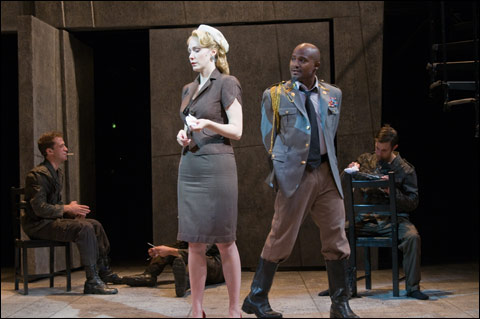
PAS DE DEUX: Seth Gilliam is a taut, military Othello, Marianne Bassham a worldly, flirtatious, ballsy Desdemona. |
The climax of Othello is less hot-blooded murder than ritual sacrifice, and the Commonwealth Shakespeare Company staging is built on that idea. This year's free offering of the Bard on Boston Common (through August 15) begins with a wordless private wedding as the berobed Moor and his bride approach each other from opposite corners of a narrow pool set into the front of the stage. The relationship will end there, too, the stream somehow incorporated into Desdemona's bedroom.
Othello is an almost operatic play (ask Verdi), and an outdoor production for which the audience ranges from folks up close to viewers on blankets a block away needs to capitalize on this. CSC artistic director Steven Maler's does, its strongest scenes its bookends. Not only is the speechless prologue lovely, but what immediately follows — clamorous encounters in which arch-villain Iago uses vividly animalistic (and offensive) language to inform father-of-the-bride Brabantio that his daughter has flown the coop to marry a black man and dad appeals to his fellow Venetian senators before repudiating Desdemona — are riveting. Then the tragic pas de deux in which duped Othello seals his and Desdemona's fates moved me to tears. In between is the blank space in which a charismatic Iago is meant to drive the play.
Shakespeare named his tragedy, in which a noble black general is spurred to irrational jealousy and then murder by a malevolent ensign, for the Moor. But as has oft been observed (and proved), a keenly drawn Iago, audaciously entangling the audience in his plot even as he makes it up, can wipe the stage with his Othello.
Here, Seth Gilliam, whom TV watchers will recognize from The Wire and Oz, is a taut, military Othello who falls to raging too early but retains his military stride and excellent diction even in the strangling clutches of the "green-eyed monster." And after all the rant, the floundering tenderness Gilliam's Moor shows Desdemona at the end is moving. But as the "honest ensign" waving his insinuations before his commander like a red cape before a bull, James Waterston is less than compelling. Sir Ian McKellen remarked of playing the role that, rather than drape himself in what Coleridge dubbed Iago's "motiveless malignity," he worked from the ensign's ostensible reasons to hate the Moor: he suspects Othello of bedding his wife, and he's mad as hell that less-proven officer Cassio has been promoted over him. Given the sincerity Waterston attaches to these gripes, he, too, sets himself in the camp of motivated Iagos. But his bad guy is more callow than crafty.
Set in the 1940s, Maler's production is clear and fleet. War is afoot, soldiers are brawling, and strong women have become necessary. In this context, Marianna Bassham's worldly, flirtatious, ballsy Desdemona — as blonde as Jean Harlow, whether poured into tight tailored suits or a glimmering, one-shouldered gown — does not seem out of place. And Dan Roach's rakish Cassio might have stepped off a World War II recruiting poster.